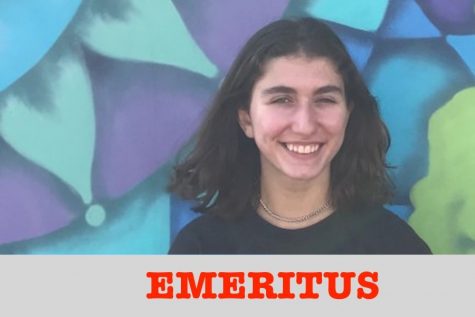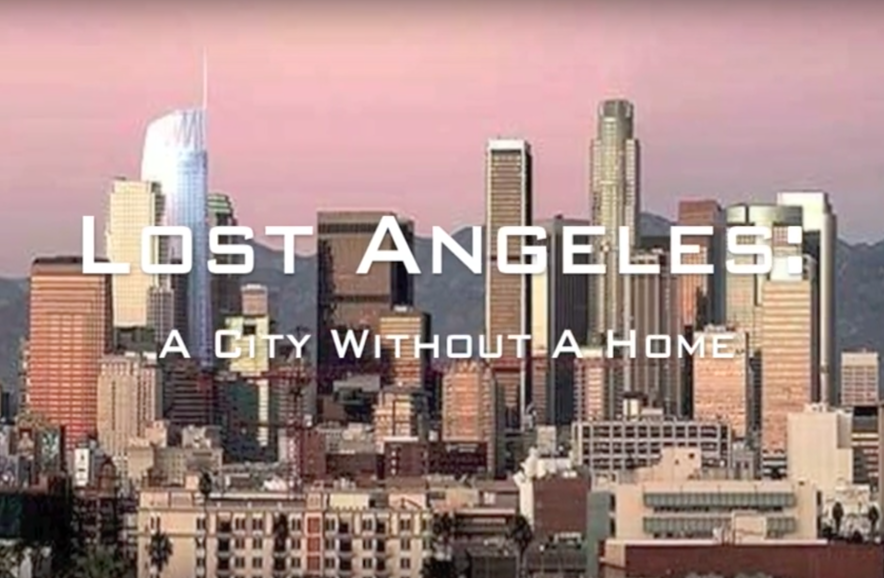Class documentary on housing crisis selected for national film festival
Lost Angeles: A city without a home, the 14-minute documentary produced by Ms. Michelle Crincoli’s and Mr. William Reusch’s film and government classes of 2015-16, has been selected to be shown at the All American High School Film Festival this month in New York City.
According to Mr. Tom Oliva, Executive Director of the All American High School Film Festival (AAHSFF), Lost Angeles was selected from among more than 2,000 entries submitted in the documentary category.
Mr. Oliva said this was “probably their strongest year in documentary” and selecting from the submissions was very difficult. There were 155 documentaries chosen.
At the festival in New York, the judges will pick 10 finalists among all of the categories, and among those will be one overall winner. Last year the overall winner was a drama titled Noose, by Jackson Shipman and Nick LaMarca of Carlsbad High School. It’s a dark comedy detailing a teen’s failed suicide attempt.
Shalhevet’s video opens with shots of stereotypical images of Los Angeles: TV show billboards, luxurious homes with backyard pools and Rodeo Drive.
“But behind this fantastical veil of luxury, are more mundane, real life challenges,” narrates alumna Maayan Waldman, class of ‘17, who was a junior when the documentary was made.
The narration, split between different student filmmakers, slowly explains how rising population and housing costs, among other factors such as real estate laws and limited tenant’s rights, have contributed to “a city without a home” — a housing crisis that has made it nearly impossible for working class individuals to remain in or move to Los Angeles.
During production, a purple bus belonging to the non-profit Mobile Film Classroom (MFC), a digital media program led by industry professionals that brings a film studio and instruction to schools, was stationed in the school parking lot. Two classes worked in this bus, and students could also drop in during their free periods. Many did.
Final edits of the film were done by the MFC staff over the summer of 2016, and the film premiered online and in a Town Hall that September.
Using voiceovers, interviews with artsy back-drops, and B-roll (background footage) of busy Los Angeles street corners and housing developments, the film presents much of the housing crisis in Los Angeles, analyzing real estate prices, laws such as the Ellis Act and interviews with experts on the housing crisis.
Interviews with both tenants and landlords — including some Shalhevet parents — tell a story of the continuous gentrification of L.A., which has made affordability and livability rarities in the ever-growing metropolis.
Among other things, the documentary describes the Ellis Act, a California state law passed in 1985 that allows landlords to “go out of the landlord business” and grants them the right to evict tenants to do so. According to the documentary, some landlords take advantage of this law to improve their apartments so they’ll be allowed to raise rents for the tenants who come next.
The film especially spotlights tenant J.P. Laven, a writer and friend of Ms. Crincoli. Mr. Laven had been evicted illegally from his apartment, which led to his skepticism about housing in Los Angeles.
Mr. Oliva, of the festival, did not remember Lost Angeles specifically because he views thousands of student films for selection. But he said it must have been excellent in order to be chosen for the festival.
“Ultimately a good documentary, the first thing that we look for is the story and does it emotionally move the needle?,” Mr. Oliva said. “By the end of watching the film, do you feel moved or changed in some way? So obviously the film succeeded at that.”
Ms. Crincoli said no one from Shalhevet plans to attend the screening, which is set for late October. She said it was her idea to to submit the film, but not because she expected it to be selected.
“Knowing this world, I don’t think you should ever expect ‘to get in,’” said Ms. Crincoli, who took over the Film class in the 2015-2016 school year. “I felt that the documentary was quality work and that it should be seen by people.”
Adam Taryle ‘17 submitted the film, because the festival requires online student submission. He was also a member of the class.
“I was kind of surprised because I thought it would be hard for us to win, but it turned out to be a pretty solid documentary,” said Adam. “I can see why it received the acclaim that it did.”
Adam said he thinks the film was selected because it had to do with a current issue that provoked people’s interest. In his junior year, he was primarily involved in the research and interview process.
Ms. Crincoli said she thinks the film made the cut because the students localized a national crisis to their hometown.
“Documentaries are about education and awareness, so how cool is it that New York City is seeing the struggles of people living in Los Angeles,” she said.

Hannah Jannol was Editor-in-Chief of the Boiling Point during the 2017-2018 school year. Since then, she has attended The New School and written for their HerCampus chapter; edited obituaries for The Trace; written poetry for Eleven and a Half literary magazine, and run Instagram and Twitter for Uptown Stories. Her favorite parts of being on Boiling Point were production night and writing long-form features stories, many of which won awards from CSPA, Quill & Scroll and the American Jewish Press Association.








